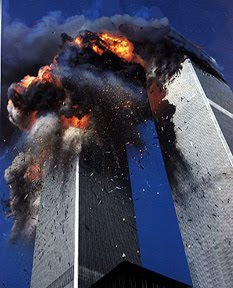
(This essay was published on September 11. 2008 in my column JUSTIFIED)
Those who cannot remember the past are condemned to repeat it.
---George Santayana, philosopher
---George Santayana, philosopher
September 11 (of 2001)is a day that would forever live in infamy. Said day was probably one of the most savage examples of man's inhumanity to man in recent memory.
History may be a witness to many inhumanities; I, however, am not.Yet on that fateful September morn halfway across the globe, violence had a field day; and I felt like an unwilling vicarious witness.
It was nighttime in Manila where I was then when September 11 happened. I was lying in bed,my mind processing the events of my day that just ended. I was roused from my ennui when my other housemates were in some sort of commotion in front of the TV.It was there captured live on CNN: the Twin Towers in New York collapsed like a deck of cards on fire as it was slammed by two hijacked planes commandeered by Al-Qaeda terrorists.Everything seemed surreal like a Hollywood blockbuster, yet the ramifications were real. Thousands of innocent lives were lost. Still thousands more lives of friends and relatives were destroyed.
Terror and subsequent paranoia shook America the invincible. Other parts of the world felt the same terror, pain and paranoia.
To say that 9/11 was simply a terrorist attack is an oversimplification. More significantly (or ignominiously), it was a horrific story of cultural and religious intolerance, violence and man's inhumanity to man---all of which led to an act of terror.
Countless more lives and property were destroyed due to terrorist attacks, mostly with underlying theme of religious dogma or cultural intolerance: London subway bombings, the Madrid attacks, the LRT bombings in Manila.
In Mindanao, certain localities are said to be hideouts to nascent groups with links to international terrorist organizations.
Several years after 9/11, I wrote an essay on Peace using the events of 9/11 as a literary backdrop. The essay won for me a 2nd prize in prestigious Palanca Peace Essay Contest sponsored by the Palanca Foundation.
It was ironic for me to be writing about peace---and winning a monetary prize for it---while recalling on paper a horrendous event such as 9/11.
It was nighttime in Manila where I was then when September 11 happened. I was lying in bed,my mind processing the events of my day that just ended. I was roused from my ennui when my other housemates were in some sort of commotion in front of the TV.It was there captured live on CNN: the Twin Towers in New York collapsed like a deck of cards on fire as it was slammed by two hijacked planes commandeered by Al-Qaeda terrorists.Everything seemed surreal like a Hollywood blockbuster, yet the ramifications were real. Thousands of innocent lives were lost. Still thousands more lives of friends and relatives were destroyed.
Terror and subsequent paranoia shook America the invincible. Other parts of the world felt the same terror, pain and paranoia.
To say that 9/11 was simply a terrorist attack is an oversimplification. More significantly (or ignominiously), it was a horrific story of cultural and religious intolerance, violence and man's inhumanity to man---all of which led to an act of terror.
Countless more lives and property were destroyed due to terrorist attacks, mostly with underlying theme of religious dogma or cultural intolerance: London subway bombings, the Madrid attacks, the LRT bombings in Manila.
In Mindanao, certain localities are said to be hideouts to nascent groups with links to international terrorist organizations.
Several years after 9/11, I wrote an essay on Peace using the events of 9/11 as a literary backdrop. The essay won for me a 2nd prize in prestigious Palanca Peace Essay Contest sponsored by the Palanca Foundation.
It was ironic for me to be writing about peace---and winning a monetary prize for it---while recalling on paper a horrendous event such as 9/11.
I coincidentally recalled all of the above memories a week ago, the first week of September when I heard my first string of Christmas carol. The song was "Christmas in our Hearts" by my all-time favorite Jose Mari Chan. Again, the irony didn't escape me:September 11 occurred during the first "ber" month of the few "ber" months leading to the Yuletide season, a season for peace.
Peace is not the absence of conflict or differences. It is when these differences or conflicts are galvanized by intolerance and violence that humans become monsters.
Hey monsters, here's a groundbreaking (at least for you) thought to consider: Give peace a chance!
Peace is not the absence of conflict or differences. It is when these differences or conflicts are galvanized by intolerance and violence that humans become monsters.
Hey monsters, here's a groundbreaking (at least for you) thought to consider: Give peace a chance!








